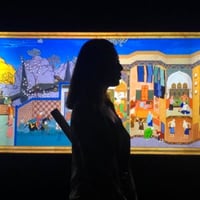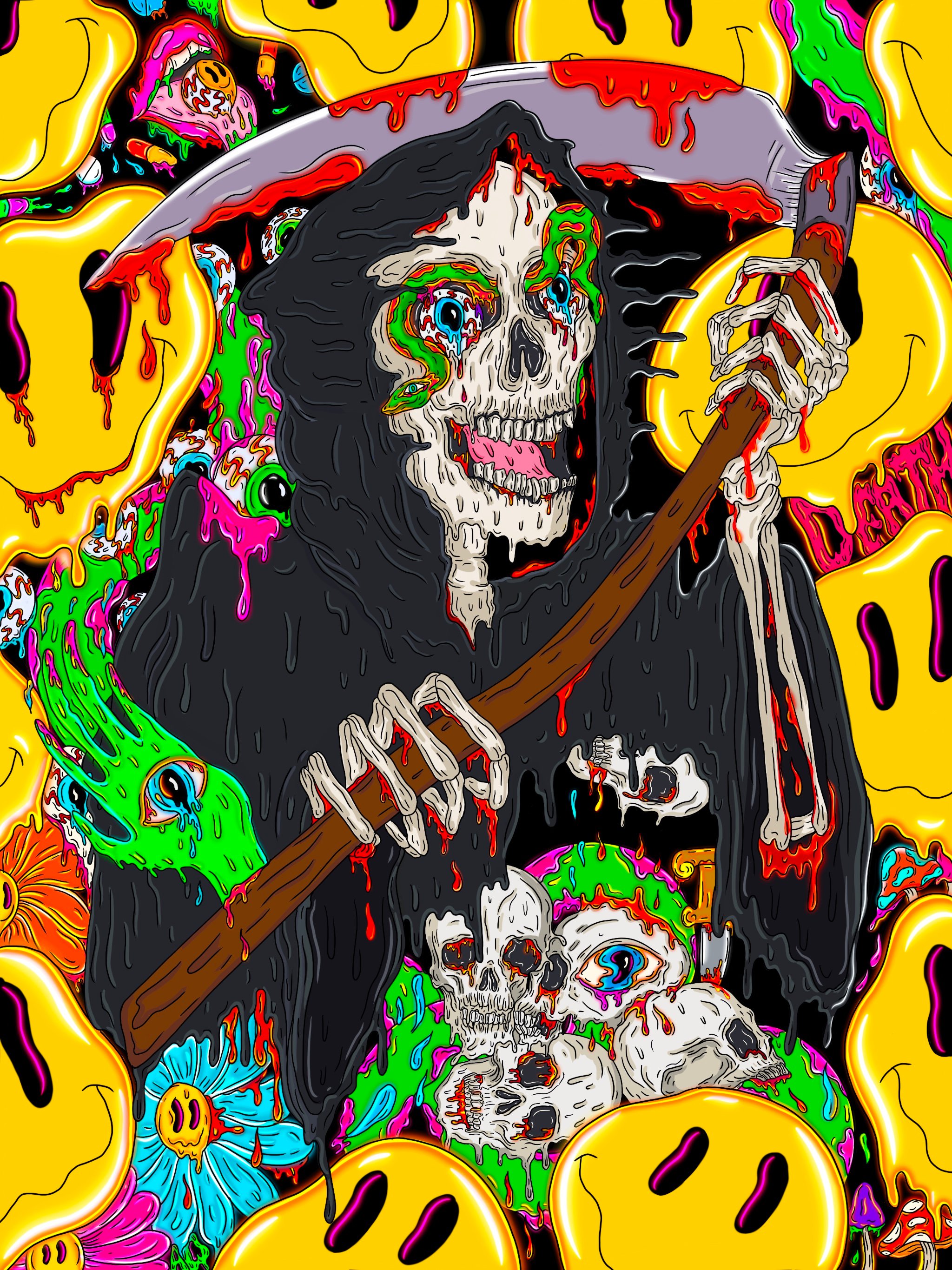Emily Xie is a visual artist living in NYC. She works with algorithms to create lifelike textures and forms. She is interested in how disparate materials and patterns come together to create unified visuals, and the stories that each might bring into the fold. She draws inspiration from physical media such as textiles, collage, and wallpaper, and examines them within a digital context.
Her generative systems often navigate many delicate balances at once: the interplays between chance versus control, the organic versus the systematic, and the abstract versus the representational.
Xie’s creative coding work is collected and shown internationally. Most recently, she has exhibited at Kunsthalle Zürich, Unit London, the Armory Show, Bright Moments, Art Blocks Curated Season 6, Vellum LA x Artsy.net, Times Square, the StandardVision Artist Showcase throughout the city of Los Angeles.
Prior to pursuing art full-time, Emily built a career as a software engineer while exploring and teaching herself creative coding on the side.
Shutong Liu: You studied History of Art and Architecture. How has that informed your artistic practice?
Emily Xie: Studying art history meant that I had a pretty strong awareness of art and how it’s been interpreted through time. Art is always in dialogue with other art, so it’s enriching to have been able to deeply consider the works of important creatives that came before me. It allowed me to think a bit about how their practices are contextualized within the history of art, which in turn informs how I might respond to the greater body of artwork out there.
I also think that having this background means that I naturally take inspiration from historic movements of the past. For example, my palettes are often based on old paintings or Japanese woodblock works. I think this tends to create an interesting dynamic in my pieces because while I work in a medium that is inherently contemporary due to its computational nature, it also tends to be fused with visual references of the past.
 “Memories of Qilin #1008” by Emily Xie, 2022.
“Memories of Qilin #1008” by Emily Xie, 2022.
SL: You released “Memories of Qilin” with ArtBlocks in March last year, since then, you have collaborated with BrightMoments and Cactoid Labs for “Off Script” and “Interwoven,” plus editions and 1/1 artworks with PROOF and Unit London and many other projects. It must have been a busy year for you. Could you speak about some of your most memorable moments for you in the past year?
Emily Xie: It has been an absolutely crazy year for me. Probably the most memorable moment for me was seeing my mini-series, “Assemblage,” up at the Armory Show in NYC through Cortesi Gallery. I’ve always enjoyed going to this art fair in the past, so it was pretty humbling to be able to attend the venue last year, but with my art up on display. I later found out that one of the buyers was from the traditional art world; she bought a piece simply because she loved the aesthetic and wanted it displayed in her home, knowing nothing about NFTs or generative art. Seeing a wider appreciation of my artwork that transcended a purely digital audience was pretty rewarding.
SL: To follow up on the previous question, how have you, as an artist, changed in the past year?
EX: Honestly, I’ve grown tremendously as an artist in the past year. For the longest time, I had engaged with generative art as a hobby on the side: something that I would dip in and out of whenever I had spare time while working as a software engineer, or whenever I got the chance to take a break from the programming industry. I did it simply because I enjoyed it: I loved tinkering and exploring, and generative art allowed me to do that in a way that directly combined visual and algorithmic thinking. And I’d say that over the past year, I’ve managed to truly crystalize my voice as an artist. I’ve been lucky to be able to develop a style that resonates with me and represents what I care about: I love patterns, lush textures, and textiles––and being able to combine these elements into organic, bold visuals. But I also believe that I continue to refine my style as I go. Every new piece that I put out is an external representation of growth for me as an artist. In some ways, I’m just getting started, and I’m excited to see where my art goes next.
 “Off Script #31” by Emily Xie, 2022.
“Off Script #31” by Emily Xie, 2022.
SL: How do you think the landscape of generative art within art history changed since NFTs? Where do you think generative art will go next? What are some trends within this genre that are becoming popular?
EX: The blockchain has certainly impacted generative art. For one, it brought awareness of the medium to a much larger audience. I don’t think there has ever been this much interest in generative art––for the longest time, I had to explain to people what the term meant. The increased awareness generally propelled generative art as a field; there is so much innovation and experimentation going on. The art that is coming out these days is incredible. On top of that, I feel that generative art is starting to get increasingly recognized by institutions.
In terms of trends, many practitioners in the past year have focused on trying to recreate static traditional media in a generative form. There’s always an appetite for this, but I do predict artists will start moving in the other direction and experimenting with works that take advantage of the specifics of the medium itself: so, perhaps we’ll see more interactivity or animation. Or maybe folks will veer in a different direction, and we’ll start seeing more pieces that are not purely generative art but instead incorporate aspects of it.
SL: Tell us about this piece you are releasing on SuperRare? Is this your first time experimenting with AI-generated assets?
EX: Yes, the piece is called “Synthetic Dialogue.” The work combines AI-generated assets with algorithmically-generated paper to create a collage. While I’ve played with AI before, this piece was exciting for me because it was the first time I’ve experimented with merging both AI and generative art into a single piece.
For the AI assets, I used DreamStudio to create a variety of abstract visuals inspired by Kandinsky and Klimt. I pulled some generative papers that my algorithms have produced. Once I had a set of interesting assets, I then cut all of the pieces digitally using Procreate, layering and combining each item into a composition that I felt was balanced and intriguing. It was a pretty rewarding experience as it let me work with my hands a bit more directly. This was a process that I had craved for a while given that my work is usually intermediated by code!
SL: As you rightly pointed out in a previous interview, artists who use computational technologies as tools to create, one finds themselves constantly learning new things. You said “technology moves fast and relentlessly shapes the landscape around us, so there’s a constant pressure to keep up in the face of such rapid change.” Could you speak about finding or retaining your own style given that you are experimenting with new tools?
EX: For this piece, even though I was working with a different process and incorporating AI, I kept a thread of continuity by porting in the generative paper textures that people might be familiar with in my work. Beyond that, I think an artist’s style will tend to follow them regardless of what medium they are exploring. That might be evident in things like choice of color or sense of balance.





